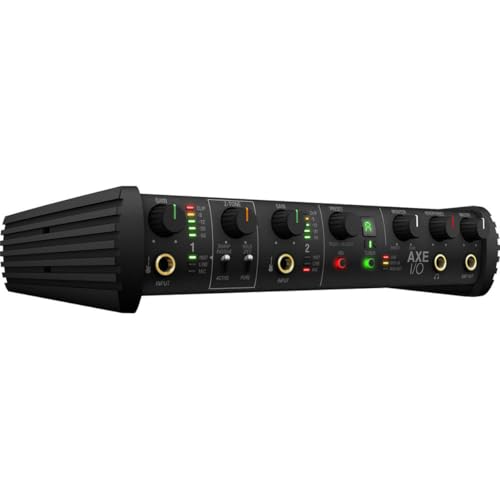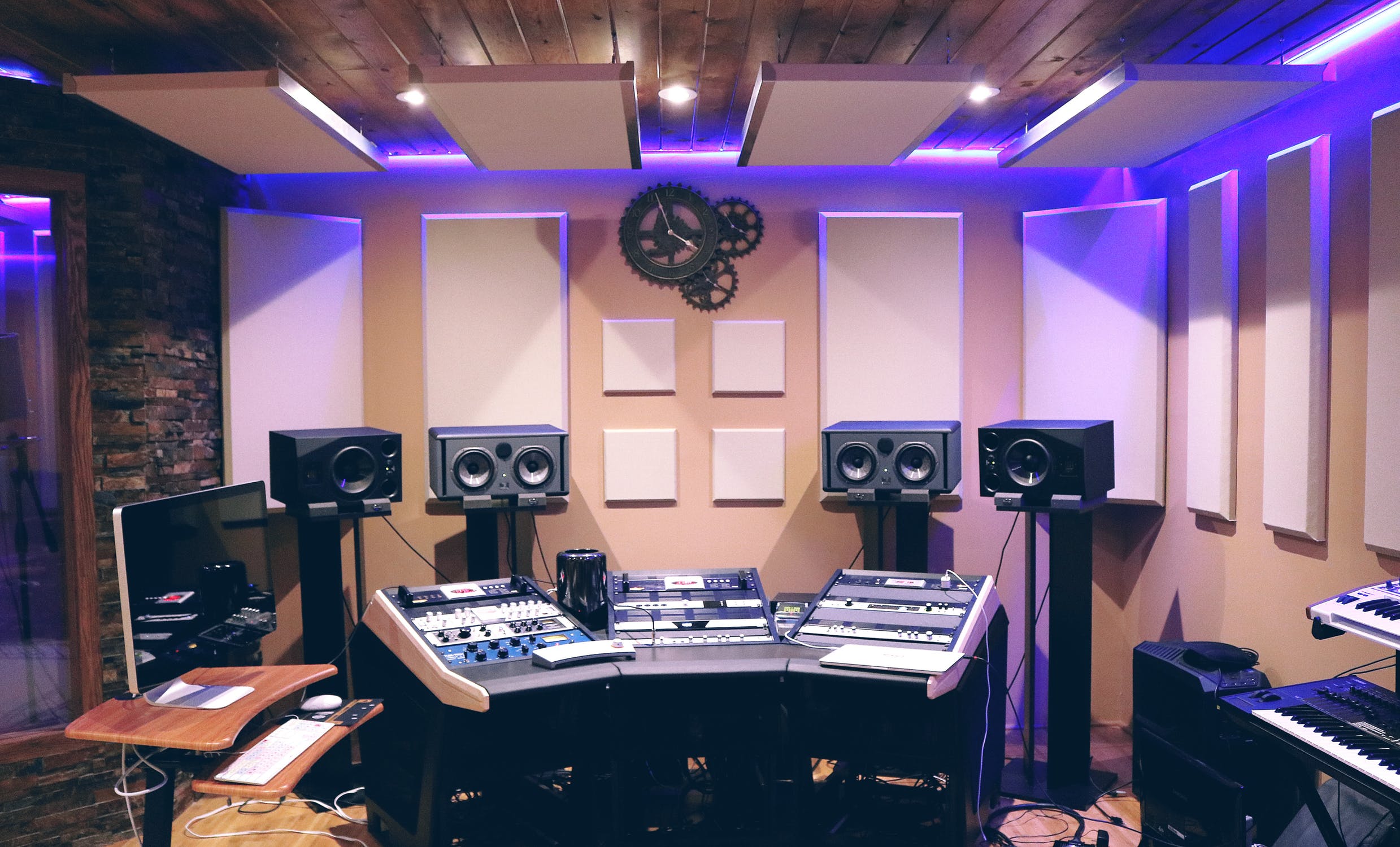A proper guitar audio interface is one of the most important pieces of gear in any computer-based recording studio. Your interface pipes all of your audio signals in and out of your computer.
Comparison Table of Best Audio Interfaces
It’s a part of every signal and sound you make and, therefore, is a crucial choice when setting up to record.
Are all the best guitar audio interfaces created equally? Absolutely not.
They all have their own particulars, especially when it comes to getting killer guitar sounds, and should be investigated thoroughly.
Today, we are meeting here to discuss what we feel are the best sounding audio interfaces for guitar recording. Ready to dive in?
Best Audio Interfaces
Table of Contents
UAD Arrow

It’s built around two of UAD’s Unison microphone preamps and highly-regarded audio converters descended from the company’s iconic Apollo interfaces and it delivers the most compelling sound in its price range.
It also comes loaded with a set of onboard UAD plug-ins that make getting album-worthy results a snap.
With its Unison technology and built-in UAD-2 SOLO Core processor, you can record through classic pieces of kit including the 610 Tube Preamp, LA-2A and 1176 compressors, and a genuine Marshall Plexi.
Did I mention that you can do all of this with almost no latency regardless of your audio buffer setting? Well, you can. Just thinking about adding one of these to my rig sets my heart aflutter.
Arrow’s proprietary Unison technology is the key to all of this magic. The integration of hardware and software in the Arrow is unlike anything else on the market.
All you have to do is throw a Unison preamp plug-in onto your mic input via Arrow’s Console software and you’re ready to get down with preamp models from API and Neve, amp emulations from Marshall and Fender, and a whole lot more.
Not only do you get the sounds of these legendary devices but they come complete with their signature impedances, gain stage “sweet spots,” and circuit behaviors. This means that Arrow feels like a real guitar amp when you play through it.
What’s even more happening is that the SOLO Core processor takes the burden off of your computer. All of this happens before your signal even hits your CPU. This is why latency is a non-issue when using Arrow.
Any player seeking a new guitar audio interface to bring their tones to the world needs to give Arrow a serious look and listen.
PROS
- Near-zero latency. In fact, you probably won’t feel any latency under your fingers.
- Full suite of onboard plug-ins.
- Award-winning preamps.
- Built-in UAD-2 SOLO Core processor to give you that real tube amp feel.
- Everything is included to record killer guitar sounds, plug in and start recording.
CONS
- Solo core processor can only handle 2-3 UAD plugins at once. So if you need more processing power, check out Twin MKII DUO or MKII QUAD instead.
- On-off switch would be nice!
- Thunderbolt 3 can cause connectivity issues with older computers.
- Desktop 2x4 Thunderbolt 3-powered audio interface with class-leading 24-bit/192 kHz audio conversion
- Unison mic preamp and guitar amp emulations from Neve , API , Manley , Marshall, Fender , and more.
- Real-time UAD processing allows near-zero latency tracking with classic UAD plug-in effects, regardless of...
See how it sounds:
Focusrite Scarlett 2i2 (3rd Gen)

The 2i2 is a USB-powered unit featuring two natural-sounding Scarlett mic preamps with plenty of balanced gain on tap as well as a switchable Air Mode that provides a brighter, more open sound to your vocal and acoustic guitar tracks.
This third-generation unit also packs two newly-designed instrument inputs formulated to take seriously hot guitar pickups with ease. Best-in-class high-level conversion and sample rates up to 192kHz / 24 bit and super-low roundtrip latency for using your plug-ins in real time also make this an attractive and useful piece for any home or project studio.
Other features include 1/4-inch balanced jack outputs for your studio monitors and one headphone output with gain control.
USB interfaces are still very popular for their combination of performance, compatibility, and price and this is pretty much the best audio interface for guitar ever made. Believe me, we’ve all made far worse choices than adding a Focusrite to our studios.
It comes complete with a ton of cool software, too, including Pro Tools First Focusrite Creative Pack, Ableton Live Lite, Softube Time and Tone Bundle, Focusrite’s Red Plug-in Suite, a 3-month Splice subscription, and your choice of one free XLN Addictive Keys virtual instrument, all available by download upon purchase and registration.
There’s even a Quick Start tool to get you recording at once. This is a great value, particularly for home recordists. You need this.
PROS
- Huge bang for the buck!
- USB-powered for easy connectivity and portability!
- It’s a Focusrite!
- The 3rd generation now includes the Air feature which were only included in the higher-price Focusrite units.
CONS
- Only two inputs. Not suitable for tracking a full band
- Pro performance with great pre-amps - Achieve a brighter recording thanks to the high performing mic pre-amps...
- Get the perfect guitar and vocal take with - With two high-headroom instrument inputs to plug in your guitar...
- Low-noise for crystal clear listening - 2 low-noise balanced outputs provide clean audio playback with 3rd...
See how it sounds:
AXE I/O

The AXE is a fully-pro 2 in/5 out unit designed first and foremost for tracking guitars faster, better, and more simply than ever before. It’s a 24-bit, 192 kHz audio interface with 2 mic preamps and 2 instrument inputs. It sports an Active/Passive pickup selector for optimal gain levels with any guitar, a Z-Tone adjustable impedance control to pull more tones from your instruments, and PURE and JFET instrument input channels to keep your sound supremely clean or add subtle saturation.
It also has a low-noise Amp Out for easy re-amping without any additional direct boxes or splitters required. When you register your AXE, you will even receive a huge software bundle with AmpliTube 4 Deluxe, Ableton Live 10 Lite and 10 T-RackS mixing plug-ins.
It’s not outrageous to call the AXE I/O a game-changing piece of kit, especially for those new to recording and for smaller project studios. It speeds up the creative process for us guitar types and offers unparalleled re-amping capabilities most players will find tonally exciting. Give this one a serious go and immediately elevate your whole operation.
PROS
- Built-in tuner!
- Amplitude 4 Deluxe costs almost as much as the AXE I/O when bought separately!
- Amp Out feature and re-amping capabilities blow away anything in its class!
- High build quality!
- Great preamps!
- Z-tone and sharp/passive buttons gives you tons of tone options
CONS
- You might feel a bit of a delay under your fingers. We tested it with the lowest sample rates and different settings, but couldn’t quite get near zero latency.
- Amplitude 4 has a bit of a learning curve however, it has tons of features and endless amount of tone options. Love or hate?
- Name-brand amp models such as Mesa and Fender must be purchased separately.
- High-resolution recording: Capture every detail with AXE I/O's 24-bit, 192 kHz dac converters and two...
- Advanced guitar tone shaping: Get the perfect sound with Z-Tone impedance-adapting circuit, Active/Passive...
- Massive software bundle: Includes AmpliTube 5 and TONEX SE, giving you over 50,000 guitar tones, capturing all...
See how it sounds:
PreSonus AudioBox

The PreSonus AudioBox USB audio interface is yet another of them. It’s a great piece to consider for anyone recording or podcasting on a tight budget and handles MIDI chores as well as audio.
It is a small, easy-to-use recording solution that is well-suited for anyone for whom portability is a concern. Throw one of these in your laptop case and you’re good to go. It’s built like a tank, too, so you know it’ll work when you finally do arrive.
The AudioBox is compatible with just about any Mac or Windows machine under the sun, so no worries about cross-platform temper tantrums here. That, alone, is a selling point for many guitarists, as we tend to like things that just plug in and play.
It has the expected two audio inputs connected to Class A mic preamps, two audio outs, plus an ultra-loud headphone jack perfect for noisy tracking environments.
You get software too, that being PreSonus’ Studio One 3 Artist DAW software for Mac and Windows.
An AudioBox is just about the easiest way to get started with computer recording. What are you waiting for?
PROS
- Compatible with most Mac and Windows computers!
- Headphone jack is louder than most!
- Small and easy to carry around.
CONS
- Tight control spacing for big hands.
- Value-packed 2-channel USB 2.0 interface for personal and portable recording.
- 2 high-quality Class-A mic preamps make it easy to get a great sound.
- 2 high-headroom instrument inputs to record guitar, bass, and your favorite line-level devices, plus MIDI I/O.
Video overview:
Last update on 2026-02-24 / Source: Amazon


I recently got my hands on Arrow. This little beast sounds amazing! I’m using it for recording vocals mainly and sometimes for bass tracks.
Been using Scarlet (1st gen) for quite a few years. What’s the difference between 1st and 2 gen? Great list btw!
I’ve heard that the 2i2 1st gen doesn’t work as well with guitars as 2nd gen, but I don’t know what those claims are relating to.
Just thinking to replace my Scarlet with UAD Arrow. Scarlet is good but Arrow sounds like a whole different level.
i wonder how the clarett pre2 USB comapres to the scarlett 2i2 ? is the price difference really justified ? i found mixed reviews (not a lot of them). my only use is practuce guitare with Bias FX and amplitube.
Thanks for your comment! Clarett preamps has a bit more character and the difference can be heard if you record though mics. Especially on vocals. For practicing with amp emulators, you probably won’t notice any difference. So i would just stick with Scarlett.